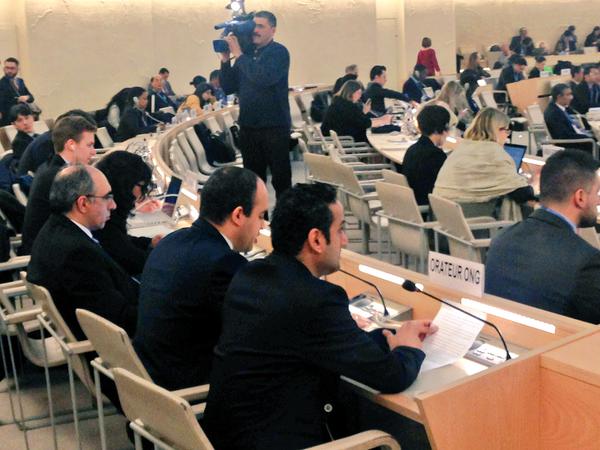On 13 March, founder & executive director of the European Saudi Organization for Human Rights (ESOHR), Ali al-Dubisi delivered an Item 3 oral intervention (Arabic) at the 28th Session of the United Nations Human Rights Council in Geneva under Item 3 on behalf of ADHRB & ESOHR. Please continue reading for a full translation of his remarks or click here to download a PDF.
الرجاء الضغط هنا لقراءة هذه الرسالة باللغة العربي
###
Mr. President,
Americans for Democracy and Human Rights in Bahrain (ADHRB) and European Saudi Organization for Human Rights have been observing the recent negative developments in the human rights situation in Saudi Arabia which are signs of concerns over the future of human rights in the kingdom.
- Since the beginning of 2015 until yesterday, the number of executions carried out reached a total of 41 executions. The number has increased multiple times compared to 2014 which was 87 cases. Execution sentences are also handed down to prisoners of conscience.
- Arrests and prosecutions are ongoing for anyone with any activity that involves talking about violations committed by the authorities. It is considered a crime to establish a civil institution over which activists like Dr. Abdulla al-Hamed and Dr. Mohammed al-Qahtani were jailed.
The violations against children have escalated. Children Ali al-Nimr, Dawood al-Marhoon, and Abdulla al-Zaher were sentenced to death based on confessions extracted under torture. We’re deeply concerned about arbitrary execution of these sentences. Also, children are kept in solitary confinement for long periods of time, like the child Abdulrahman al-Mudaifer who has been in solitary confinement for 4 months.
Moreover, violations against women’s rights are worsening. Two ladies, Lujain al-Hathloul and Maysaa al-Amoodi, were jailed for 3 months for driving a car. Women’s rights advocate Samar Badawi was prevented from traveling because of a statement she delivered to your esteemed council. Bahia al-Rashodi was arbitrarily arrested and sentenced to 10 months in prison for advocating on behalf of detainees.
Furthermore, reprisals against human rights defenders could also end in the death penalty, like in the case of Sheikh Nimr al-Nimr. Waleed Abu al-Khair and Fadhel al-Mnasf remain imprisoned over sentences of 15 and 14 years respectively. In addition, activists are re-tried in reprisal for their human rights stances and for not retreating, as in the case of Mohammed al-Badjadi, who was sentenced to 10 years in prison last year. The detention of writers and poets continue, such as wrtier Zakariya Safwan who was sentenced to 10 years in prison and poet Adel Labs sentenced to 13 years in prison; their only crime is expressing their rights through peaceful articles and poems. They are called terrorists and convicted based on the terrorism law, which is in violation of international conventions.
Although Saudi signed the Convention Against Torture in 1997, it continues to use systematic physical and psychological torture, including subjecting detainees to electric shocks, beating them with various tools and methods, hanging, prevention of the use of toilet, extreme temperatures, prevention of sleep, medical negligence, solitary confinement for periods exceeding a year in some cases, and insults of dignity, honor and belief.
The principle of impunity that is applied in Saudi has contributed to escalation of use of excessive force. The authorities killed 26 civilians, including 9 killed during participation in demonstrations, without even launching investigation in any of these cases.
In most arrest cases, due process is not followed. The authorities systematically carry out arbitrary arrests and subject victims to varying periods of enforced disappearances.
There is a vast difference between the Saudi official statement and reality. Therefore, we urge Saudi to allow visits by Special Procedures, including the Special Rapporteur on torture who did not receive any response to the three requests he has submitted since 2006. Saudi denied in its report the use of torture, while I personally am one of those who was subjected to torture. I heard the agonizing voices of other people also being tortured with electrocution and beating in the CID prisons to the extent that their cases need physical and psychological treatment.





